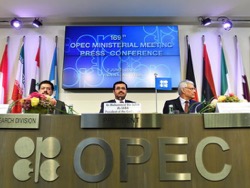
A few weeks before the meeting of the members of the Organization of countries-exporters of oil, is scheduled for June 2, one of the leading representatives of the Russian oil industry made the kind of Eulogy speech to the OPEC. In his interview to the Agency “Reuters”, which was published on 10 may, the Chairman of the Board of Directors of “Rosneft” Igor Sechin said that OPEC “has virtually ceased to exist as a unified organization.” A more pessimistic view that “OPEC is dead,” was made at the OPEC meeting on 5 may.
According to Sechin, the world oil market is currently driven by multiple factors such as Finance, technology, government regulation and production of shale gas in the United States that “eliminates the opportunity for any cartel to dictate to the market.” This statement echoes the statement that Sechin was made in October of last year, that the US has all the opportunities to influence the development of a competitive oil market,” and that the medium-term prospects for the world oil market will be determined by the market in the United States.” Sechin reminded his interlocutor that he (and “Rosneft”) from the very beginning were skeptical about the proposal to “freeze production” and so far sees no possibility for collective action of OPEC.
The same view is shared by the representative of Saudi Arabia to OPEC Mohammad al-Mahdi (Mohammed al-Madi), which States that the OPEC countries and countries that are not part of that organization needs “to take seriously recent changes in the market” and recognize that the market is going through structural changes, becoming more “competitive, not monopolistic”. Comments by the representative of Saudi Arabia indicate that the likelihood of a coordinated market intervention decreases with each passing day, especially considering the fact that all the major manufacturers now are waging a fierce struggle for a share in the global oil market and that supply and demand will regain their equilibrium more or less already around the end of 2016 or early 2017.
One thing is sure: now there is a fairly low probability of conflicting signals from the Minister of oil of Saudi Arabia, Deputy crown Prince of Saudi Arabia Mohammed bin Salman (Mohammed bin Salman), similar to the statements that condemned the April talks in Doha to fail. May 7 in Saudi Arabia caused a serious reshuffle in the Cabinet of Ministers, in which Minister of petroleum and mineral resources Ali al-Naimi (Ali al-Naimi) on this post was replaced by Khalid al-falih, head of Saudi oil giant Aramco award. This changing of the guard is part of an ambitious programme of structural adjustment known as the “Saudi vision 2030, for which there is a Deputy crown Prince. It was his intervention led to the failure of the Doha negotiations: he delivered an ultimatum, stating that Saudi Arabia will not freeze the prey, if Iran does not do the same.
As I wrote earlier, Saudi Arabia was deliberately trying to push Russia into the background to prevent it in the future to participate in the decision-making process of OPEC. Russian energy Minister Alexander Novak did not receive a written invitation to the June meeting. Although Novak intends to maintain its contacts with OPEC and Saudi Arabia, he has no plans to meet or speak with the new Saudi Minister of oil. According to Novak, further negotiations on the issue of freezing of production is not planned, because the market has stabilized.
In the case of disagreements at the talks in Doha between Saudi Arabia and Russia over Iran, have become a serious problem that a long time will have a negative impact on cooperation between the two countries in the energy field. Despite all the statements of Riyadh that his policy on oil production is entirely due to the market situation, the results of the talks in Doha were the result of geopolitical and geo-economic factors associated with Iran, and not technocratic disagreement over the issue of how to behave in the new environment. Direct talks at the Ministerial level between Moscow and Riyadh on issues connected with the situation on the global oil market is unlikely to resume in the near future. And even if they resume, they are unlikely to be characterized by the same level of cooperation that we saw during the “freeze production” over the last few months.
Meanwhile, Iran continues to increase production and exports, trying to regain lost market share. In April, the volume of oil production in Iran made up 3.56 million barrels a day and exports 2 million barrels per day — the highest level since 2011. May 6, Mohsen Kamsari (Mohsen Qamsari, Director for international Affairs of the state national Iranian oil company, said that the volume of production of Iran has reached a level sufficient to join the initiative to freeze production. However, on 9 may, the Minister of oil of Iran explicitly corrected him, openly declaring that Iran is willing to freeze production until the production volumes do not reach 4 million barrels a day. Now we have a ruthless struggle for market share, exacerbated by relentless geopolitical rivalry between Saudi Arabia and Iran (and Russia) in which the other members of OPEC and other countries will be assigned the observer role.








